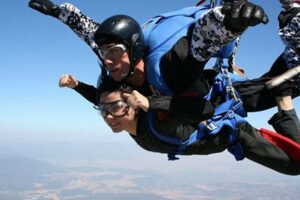Table of Contents
Skydiving while pregnant defies the conventional wisdom that pregnancy confines women to a sedentary lifestyle. This daring activity involves a pregnant woman freefalling from a significant height, attached to a trained skydiving instructor.
Skydiving during pregnancy has gained traction as a means of empowering pregnant women and challenging societal norms. It offers unique physical and mental benefits, including increased confidence, reduced stress, and improved cardiovascular health. Historically, the first recorded instance of skydiving while pregnant occurred in 2010, paving the way for more women to embrace this extraordinary experience.
This article delves into the safety, regulations, and medical considerations surrounding skydiving while pregnant. It explores the motivations behind this audacious pursuit and the transformative impact it can have on expectant mothers.
Skydiving While Pregnant
Skydiving while pregnant is a complex topic that encompasses various essential aspects, including safety, regulations, and medical considerations. Understanding these aspects is crucial for expectant mothers contemplating this daring activity.
- Safety: Ensuring the well-being of both mother and baby
- Regulations: Adhering to guidelines and restrictions
- Medical Considerations: Evaluating potential risks and benefits
- Physical Impact: Understanding the effects on the body
- Mental Impact: Exploring the psychological benefits and challenges
- Motivations: Delving into the reasons behind this pursuit
- Historical Context: Tracing the evolution of skydiving while pregnant
- Societal Impact: Examining the broader implications and perceptions
These aspects are interconnected and influence each other. For instance, safety regulations are informed by medical considerations, while the physical impact of skydiving can have both positive and negative effects on the mental well-being of the mother. By exploring these aspects thoroughly, we gain a comprehensive understanding of skydiving while pregnant and its implications for expectant mothers and the medical community.
Safety
In the realm of skydiving while pregnant, safety remains paramount. It encompasses a multifaceted approach that prioritizes the well-being of both the mother and the developing baby. This involves adhering to strict guidelines, meticulous planning, and constant monitoring throughout the experience.
- Medical Clearance: Before embarking on a skydiving adventure, expectant mothers must obtain medical clearance from a qualified healthcare professional. This assessment evaluates their overall health, assesses potential risks, and ensures the pregnancy is progressing normally.
- Instructor Expertise: Choosing an experienced and certified skydiving instructor is crucial. They undergo rigorous training to handle the unique demands of skydiving while pregnant, ensuring the safety and comfort of both mother and baby.
- Specialized Equipment: Specialized equipment is utilized to accommodate the changing body of a pregnant woman. This includes a full-body jumpsuit, a modified harness system, and an altimeter to monitor altitude and descent rate.
- Controlled Environment: Skydiving while pregnant is typically conducted in a controlled environment, such as a private airfield or dropzone. This allows for close supervision by medical personnel and ensures prompt access to emergency services if needed.
By adhering to these safety measures, expectant mothers can minimize potential risks and increase the likelihood of a positive and memorable skydiving experience. It is essential to approach this activity with a thorough understanding of the safety protocols and to prioritize the well-being of both mother and baby throughout the process.
Regulations
In the realm of skydiving while pregnant, regulations serve as a cornerstone of safety and responsible practice. Adhering to established guidelines and restrictions is paramount to mitigating risks and ensuring a positive experience for both the expectant mother and the developing baby.
One critical aspect of regulations involves medical clearance. Expectant mothers must undergo a thorough medical evaluation to assess their overall health and determine if they are fit to participate in skydiving. This assessment considers factors such as the stage of pregnancy, any underlying medical conditions, and the mother’s physical capabilities. By adhering to these regulations, healthcare professionals can identify potential risks and advise mothers accordingly.
Another important regulation pertains to the experience and qualifications of skydiving instructors. Instructors who work with pregnant women must undergo specialized training to understand the unique physiological and emotional considerations involved. They are responsible for ensuring the safety and comfort of both the mother and the baby throughout the skydiving experience.
Regulations also encompass the use of specialized equipment. Pregnant women skydiving require modified harnesses and jumpsuits to accommodate their changing body shape and provide optimal support. Additionally, altimeters are used to monitor altitude and descent rate, ensuring a controlled and safe landing.
Understanding and adhering to regulations are essential for promoting a safe and enjoyable skydiving experience while pregnant. These regulations provide a framework for expectant mothers to make informed decisions, minimize risks, and maximize the potential benefits of this unique activity.
Medical Considerations
When considering skydiving while pregnant, medical considerations play a pivotal role in ensuring the safety and well-being of both the mother and the developing baby. These considerations involve a comprehensive evaluation of potential risks and benefits, which is critical for informed decision-making and responsible participation in this activity.
Medical clearance from a qualified healthcare professional is paramount before engaging in skydiving while pregnant. This assessment evaluates the mother’s overall health, including factors such as the stage of pregnancy, any underlying medical conditions, and her physical capabilities. By carefully assessing these factors, healthcare professionals can identify potential risks and provide guidance on whether skydiving is a suitable activity during pregnancy.
Understanding the potential risks and benefits of skydiving while pregnant is crucial for expectant mothers. Potential risks include the effects of sudden changes in altitude and air pressure on the developing baby, as well as the physical demands of the activity on the mother’s body. On the other hand, some studies suggest that skydiving while pregnant may offer certain benefits, such as reducing stress and anxiety levels and promoting a sense of well-being.
In practice, medical considerations are integral to ensuring a safe and enjoyable skydiving experience while pregnant. By adhering to medical advice and regulations, expectant mothers can minimize risks and maximize the potential benefits of this unique activity. This understanding empowers women to make informed choices, prioritize their health and the well-being of their baby, and engage in skydiving with confidence and peace of mind.
Physical Impact
When engaging in skydiving while pregnant, understanding the physical impact on the body is paramount for ensuring the well-being of both the mother and the developing baby. Skydiving involves sudden changes in altitude and air pressure, which can exert varying degrees of stress on the body.
One of the primary physical effects of skydiving while pregnant is the increased gravitational force experienced during freefall. This force can put pressure on the mother’s abdomen and potentially affect the baby’s position. Additionally, the rapid descent and changes in air pressure can cause temporary discomfort or dizziness in some women.
However, it is important to note that many pregnant women report experiencing minimal to no adverse physical effects from skydiving. In fact, some studies suggest that skydiving may even offer certain physical benefits, such as reducing stress and anxiety levels. Nonetheless, it is crucial for expectant mothers to consult with their healthcare providers and carefully consider their own physical condition before participating in this activity.
Understanding the potential physical impact of skydiving while pregnant allows healthcare professionals and expectant mothers to make informed decisions and take appropriate precautions to minimize risks. By adhering to medical advice and regulations, women can engage in skydiving with confidence and enjoy the unique experience while prioritizing the safety and well-being of themselves and their unborn babies.
Mental Impact
Engaging in skydiving while pregnant presents a unique interplay of physical and mental experiences. Understanding the psychological impact of this activity is crucial for expectant mothers contemplating this daring feat. This exploration delves into the multifaceted mental benefits and challenges associated with skydiving while pregnant, providing insights into the emotional and cognitive aspects of this extraordinary endeavor.
-
Conquering Fears
Skydiving while pregnant can be a powerful means of confronting and overcoming fears. Embracing this challenge can boost self-confidence, resilience, and a sense of accomplishment. -
Stress Reduction
The rush of adrenaline and the focus required during skydiving may provide a temporary respite from the stresses of pregnancy and everyday life. -
Mindfulness and Presence
Skydiving demands intense concentration on the present moment. This can promote mindfulness and a heightened awareness of one’s surroundings. -
Emotional Bonding
Sharing the skydiving experience with a supportive partner or loved ones can strengthen emotional bonds and create lasting memories.
Recognizing the potential mental benefits and challenges allows expectant mothers to make informed decisions and approach skydiving with a balanced perspective. Understanding the emotional and cognitive dimensions of this activity empowers women to harness its transformative potential while prioritizing their well-being and the health of their unborn child.
Motivations
Understanding the motivations behind skydiving while pregnant is a crucial aspect of exploring this unique activity. Motivations serve as the driving force behind an individual’s decision to engage in this daring feat, shaping their expectations, mindset, and overall experience.
One primary motivation is the desire for personal growth and empowerment. Skydiving while pregnant can be seen as a challenge that tests physical and mental limits, leading to increased self-confidence, resilience, and a sense of accomplishment. It can also be a way for expectant mothers to defy societal norms and demonstrate their strength and determination.
Another motivation is the pursuit of a unique and memorable experience. Skydiving while pregnant offers an unparalleled combination of exhilaration, freedom, and connection with nature. It creates lasting memories and a profound sense of accomplishment that can be cherished throughout pregnancy and beyond.
Furthermore, some expectant mothers find skydiving to be a therapeutic and stress-reducing activity. The focus and concentration required during the experience can provide a temporary escape from the physical and emotional demands of pregnancy. The rush of adrenaline and the sense of accomplishment can also boost mood and promote a feeling of well-being.
In conclusion, exploring the motivations behind skydiving while pregnant provides insights into the personal, emotional, and psychological factors that drive individuals to participate in this extraordinary activity. Understanding these motivations allows for a more comprehensive and nuanced perspective on the phenomenon of skydiving while pregnant and its potential impact on expectant mothers.
Historical Context
Understanding the historical context of skydiving while pregnant sheds light on the evolution of this daring activity and its impact on expectant mothers. Historically, skydiving was considered an exclusively male-dominated sport, with societal norms and safety concerns limiting women’s participation. However, in recent decades, a growing number of women have defied these norms and embraced skydiving during pregnancy.
One of the key factors driving the evolution of skydiving while pregnant has been the advancement of safety technologies and training protocols. The development of specialized equipment, such as modified harnesses and jumpsuits, has made it possible for pregnant women to engage in skydiving with increased safety and comfort. Additionally, the establishment of comprehensive training programs for skydiving instructors has ensured that pregnant women receive proper guidance and supervision throughout their experience.
Real-life examples of the historical evolution of skydiving while pregnant include notable individuals such as Lori Thomas, who made headlines in 2010 as the first woman to skydive while pregnant. Her experience paved the way for other expectant mothers to consider skydiving as a viable activity, challenging societal perceptions and demonstrating the strength and resilience of pregnant women.
The practical significance of understanding the historical context of skydiving while pregnant lies in its ability to inform decision-making and promote safety. By learning from the experiences and advancements of the past, expectant mothers and healthcare professionals can make informed choices about whether skydiving is a suitable activity during pregnancy. Additionally, this understanding helps shape regulations and guidelines, ensuring that safety remains paramount while allowing pregnant women to enjoy this unique experience.
In summary, the historical context of skydiving while pregnant is intricately connected to the evolution of this activity. As safety technologies and training protocols have advanced, societal norms have gradually shifted, allowing more expectant mothers to embrace the challenge of skydiving. Understanding this historical context provides valuable insights for decision-making, promotes safety, and highlights the resilience and determination of pregnant women.
Societal Impact
Exploring the societal impact of skydiving while pregnant unveils the intricate relationship between this daring activity and its broader implications on cultural norms, perceptions, and gender roles. Societal impact encompasses the multifaceted effects that skydiving while pregnant has on society, including its potential to challenge traditional views on pregnancy, empower expectant mothers, and inspire a more inclusive and equitable society.
As a critical component of skydiving while pregnant, societal impact influences how this activity is perceived and accepted within different cultural contexts. In many societies, pregnancy has been traditionally associated with limitations and restrictions, with women often discouraged from engaging in physically demanding or adventurous activities. Skydiving while pregnant disrupts these societal norms, challenging the notion that pregnancy is a time of fragility and inactivity. By participating in this daring feat, expectant mothers demonstrate their strength, resilience, and determination, defying societal expectations and inspiring others to rethink the boundaries of what is considered possible during pregnancy.
Real-life examples abound of the societal impact of skydiving while pregnant. In 2010, Lori Thomas made headlines as the first woman to skydive while pregnant, drawing global attention to the activity and sparking conversations about the changing roles and capabilities of pregnant women. Her experience paved the way for other expectant mothers to embrace skydiving, empowering them to defy societal norms and pursue their passions while pregnant. Furthermore, the growing visibility of skydiving while pregnant has contributed to a broader cultural shift, promoting greater acceptance and understanding of the diverse experiences and choices of pregnant women.
Understanding the societal impact of skydiving while pregnant has practical applications in various fields, including healthcare, social policy, and gender equality. By examining the challenges and opportunities presented by this activity, healthcare professionals can better support expectant mothers who wish to engage in skydiving, ensuring their safety and well-being while respecting their choices. Social policymakers can consider the implications of skydiving while pregnant for public health and safety regulations, fostering a more inclusive and equitable society that recognizes the diverse needs and aspirations of pregnant women. Furthermore, understanding the societal impact of skydiving while pregnant can contribute to broader discussions on gender equality, challenging stereotypes and promoting greater opportunities for women in all aspects of life.
In summary, societal impact is a critical component of skydiving while pregnant, influencing its perception, acceptance, and the broader cultural implications it carries. By examining the societal impact of this activity, we gain valuable insights into the changing roles and capabilities of pregnant women, challenge societal norms, and contribute to a more inclusive and equitable society that empowers expectant mothers to make choices that align with their passions and aspirations.
Frequently Asked Questions (FAQs) About Skydiving While Pregnant
This FAQ section addresses common questions and concerns surrounding skydiving while pregnant. It aims to provide expectant mothers and healthcare professionals with essential information to make informed decisions about engaging in this unique activity.
Question 1: Is skydiving while pregnant safe?
The safety of skydiving while pregnant is a primary concern. With proper medical clearance, specialized training, and strict adherence to safety protocols, skydiving can be a relatively safe activity for expectant mothers. However, it is crucial to prioritize the well-being of both the mother and the developing baby.
Question 2: What are the potential risks of skydiving while pregnant?
Potential risks include the effects of sudden changes in altitude and air pressure on the developing baby, as well as the physical demands of the activity on the mother’s body. Open communication with healthcare providers and careful consideration of individual circumstances are essential to minimize these risks.
Question 3: Are there any medical conditions that prevent skydiving while pregnant?
Certain medical conditions, such as pre-eclampsia, placenta previa, or a history of pregnancy complications, may preclude skydiving during pregnancy. Expectant mothers should consult with their healthcare providers to assess their individual suitability for this activity.
Question 4: What are the physical and mental benefits of skydiving while pregnant?
Skydiving while pregnant may offer certain physical benefits, such as reducing stress and anxiety levels, and promoting a sense of well-being. Additionally, it can be a powerful means of confronting fears, boosting self-confidence, and creating lasting memories.
Question 5: How do I prepare for skydiving while pregnant?
Preparation involves obtaining medical clearance, choosing an experienced and certified instructor, and familiarizing oneself with safety protocols. Specialized equipment, such as modified harnesses and jumpsuits, is used to accommodate the changing body of a pregnant woman.
Question 6: What should I expect on the day of my skydive?
On the day of the skydive, expectant mothers can expect a comprehensive safety briefing, followed by the skydiving experience itself. Close supervision by medical personnel and access to emergency services are typically provided to ensure the safety of both the mother and the baby.
These FAQs provide a concise overview of key considerations for skydiving while pregnant. Expectant mothers are encouraged to consult with their healthcare providers, research reputable skydiving companies, and prioritize their well-being throughout the process. The following sections will delve deeper into the various aspects of skydiving while pregnant, empowering expectant mothers to make informed decisions and enjoy this unique experience responsibly.
Tips for Skydiving While Pregnant
To ensure a safe and enjoyable skydiving experience while pregnant, expectant mothers are advised to follow these important tips:
Tip 1: Obtain Medical Clearance
Before engaging in skydiving, consult with a qualified healthcare provider to assess your overall health, evaluate potential risks, and obtain medical clearance for the activity.
Tip 2: Choose an Experienced Instructor
Select a skydiving instructor who is experienced in working with pregnant women. They will provide specialized guidance and ensure your safety throughout the experience.
Tip 3: Wear Specialized Equipment
Utilize a full-body jumpsuit, modified harness system, and altimeter specifically designed to accommodate the changing body of a pregnant woman.
Tip 4: Skydive in a Controlled Environment
Choose a private airfield or dropzone with close supervision by medical personnel and prompt access to emergency services.
Tip 5: Consider Your Physical and Emotional State
Listen to your body and only skydive if you are feeling healthy and emotionally prepared for the experience.
Tip 6: Stay Hydrated
Drink plenty of fluids before and after skydiving to maintain hydration and support your overall well-being.
Tip 7: Inform Your Support Team
Let your family, friends, or a trusted individual know about your plans to skydive while pregnant. They can provide support and assistance if needed.
Tip 8: Enjoy the Experience
Skydiving while pregnant can be an empowering and memorable experience. Relax, focus on the present moment, and embrace the exhilaration of this unique activity.
Following these tips can help expectant mothers minimize risks and maximize the benefits of skydiving while pregnant. It is crucial to prioritize safety, consult with healthcare professionals, and approach the experience with a positive and informed mindset.
In the next section, we will explore the transformative impact of skydiving while pregnant, examining how this activity can empower expectant mothers and challenge societal norms.
Conclusion
Skydiving while pregnant is an activity that challenges traditional norms and empowers expectant mothers. It offers unique physical and mental benefits, while also fostering a sense of accomplishment and resilience. By adhering to safety guidelines, choosing experienced instructors, and prioritizing well-being, expectant mothers can enjoy this extraordinary experience.
Key points to consider include: the importance of medical clearance and specialized equipment, the need for a supportive team and a positive mindset, and the potential for skydiving to challenge societal perceptions and promote gender equality. These elements are interconnected and contribute to a comprehensive understanding of skydiving while pregnant.







